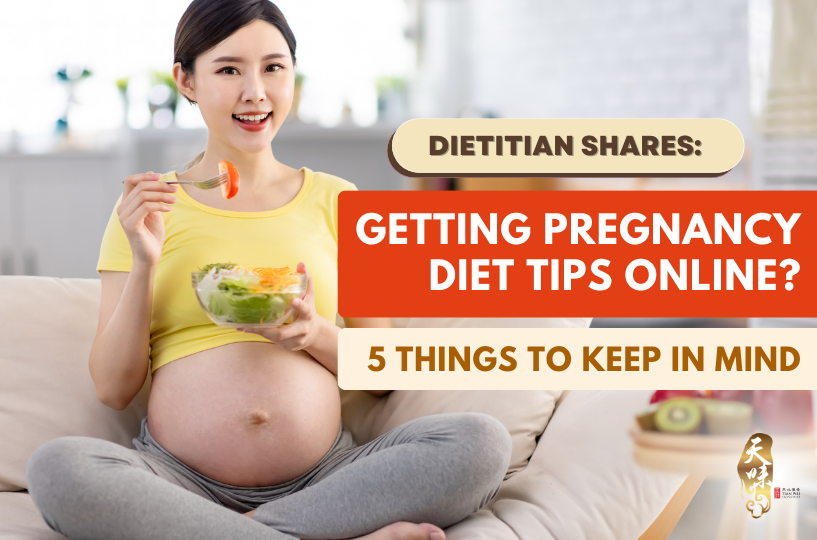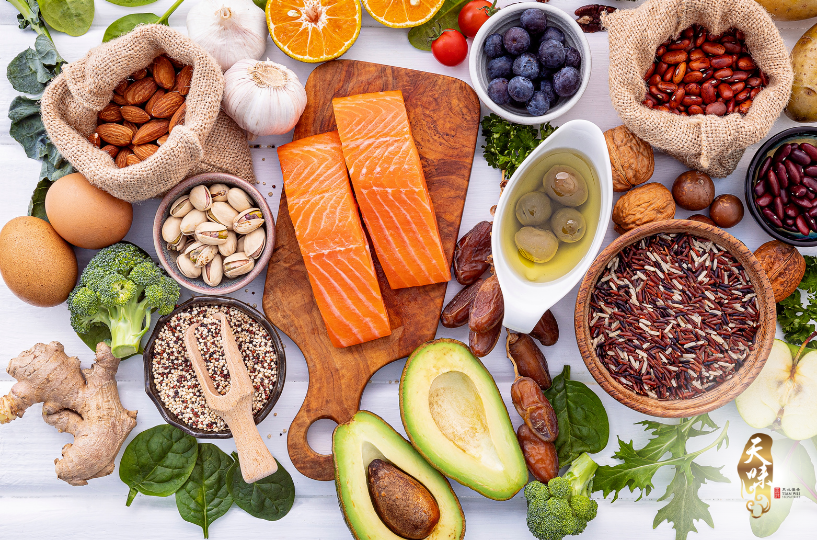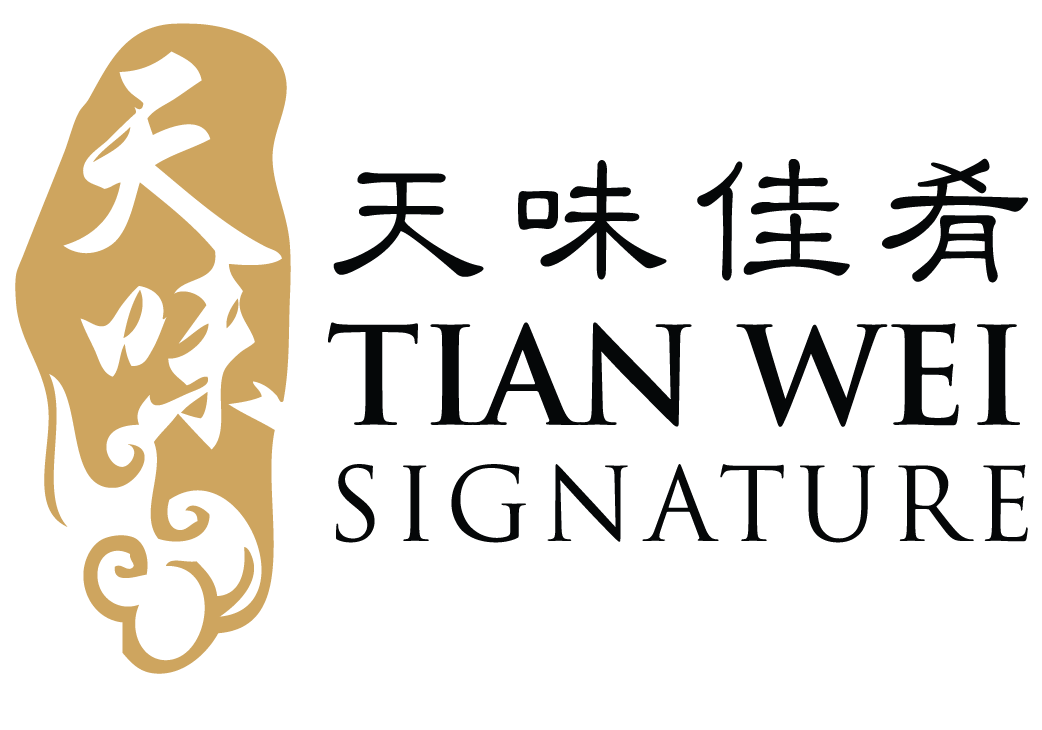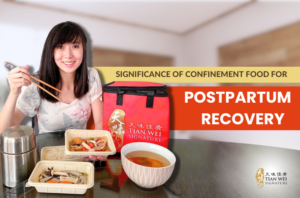81 Tagore Lane, TAG A, #01-11 Singapore 787502 ♦ Reservation : +65 6727 5599
Dietitian Shares: Getting Pregnancy Diet Tips Online? 5 Things to Keep in Mind

The internet is a massive space of information. It has been able to open up our horizons on how much we can learn from one another online. Whether it’s information on nutrition, medical diagnosis or side effects of certain medications, everything is now available right below our thumbs.
The great thing about the internet phenomenon is that the power of knowledge is given to everyone. Many more people are able to take initial steps to manage simple challenges in life earlier and more efficiently. These days, you can find information on weight loss, pregnancy nutrition plans, postpartum care and many more. Nutrition during pregnancy is certainly not spared from this.
Studies have shown that more than 90% of pregnant women around the world obtain their nutritional information online. As great as it is, it can be overwhelming and confusing about the right diet for pregnant mothers. Everyone on the internet feels like they can have a say about what is best for everyone just because food is part of their daily life.
So here are a few tips from a Dietitian about what to keep in mind as you obtain your nutrition during pregnancy online.
#1 Generalised Information on the Internet
The internet is a space for the masses. Thus, responsible content creators or writers would provide information that is possibly helpful to the public. Sometimes, nutritional tips can be practical to solve simple problems about eating during pregnancy. However, these solutions may or may not work for everyone.
Many of these solutions and tips may only solve 1 angle of the issue while forgoing other possible related issues you may be experiencing together during pregnancy. For instance, you may have constipation, but you also have gestational diabetes. A common solution recommended online is to have more fruits to relieve constipation. However, what is not explained further is that due to gestational diabetes, too much intake of fruits in one setting may dangerously spike up your blood glucose levels. Thus, following such recommendations blindly may do more harm than good. The general recommendation found online may not be suitable for you and only applies to those who have constipation without gestational diabetes.
#2 Mixed With Misinformation
The internet is a pool of information from all over the world and from people of different backgrounds and needs. Thus, many tips given about nutrition during pregnancy may not necessarily be based on scientific evidence. It can be a mixture of personal experience, professional opinions on the subject matter or old wife’s tales. This means that without the full context, the solution suggested may be detrimental to you, such as the diabetic condition mentioned in the previous point above.
It is important to note that a popular solution does not mean that it is a safe and suitable solution for you because your conditions and needs may be different from those around you.
Aside from that, there are plenty of diet fads and exaggerated claims online about how such diet practices or products may be helpful in solving all your problems, like brain fog, tiredness, and so forth. There is too much pseudoscience that sounds legit to the average person.
#3 If It Sounds Too Good to Be True, It Probably Is
Human beings are always out on the lookout for a cheat code in life. We want to believe we can “neutralize” the bad dietary or lifestyle habits with a pill or a supplement. We hope the one or two good habits we start practising will overcome the effects of all our bad habits overnight.
The thing is, you cannot run away from the foundation of good health, which is good nutrition, active lifestyle, adequate sleep and good stress management. Even during pregnancy, good nutrition and lifestyle are your best bet to giving yourself and your baby the best chance at life and a smooth pregnancy.
Supplements are there to supplement and boost our diet, not to be fully dependent on as a magic pill or to sustain us. Whole foods are what sustains us. So, if you see someone promising a product to help detox your body or promoting a shake that will solve all your nutrition issues during pregnancy, it is best to avoid such content.
If in doubt, always go back to your gynae or dietitian regarding anything you consume or put on, especially regarding medications, supplements and diet trends. Going it over with them before starting anything new is best.

#4 Choose Reputable Sites
An easy way to know what is generally good for you during pregnancy is by checking such information on reputable sites that represent a professional body, the Ministry of Health or reputable organizations that are known in the field of pregnancy and nutrition.
Some of the reputable and reliable sites that share content on nutrition during pregnancy for the general public that you can rely on are Health Promotional Hub by the Singapore Ministry of Health, the World Health Organization (WHO), The National Health Service (NHS) by the UK, Centre for Disease Control and Prevention (CDC) by the USA and the Academy of Nutrition and Dietetics by the USA just to name a few.
Much of what is shared on these pages is nutritional information about pregnancy and postpartum that has been well-established with adequate scientific evidence. It is generally safe and reliable to follow.
#5 Choose Healthcare Professionals That Are Experts in the Subject Matter
A doctor is the best person to seek information regarding medical-related problems. On the other hand, a pharmacist is the best person to seek information regarding medications and any other possible drug interactions.
When it comes to nutrition, the Dietitian is best. Dietitians are trained to understand nutrition and how it relates to our body at different stages of life, including pregnancy and postpartum. Dietitians are also trained for 4 years to understand how influential nutrition is in different medical conditions, especially in those who may experience certain complications during pregnancy, such as gestational diabetes, pre-eclampsia, irritable bowel syndrome and many more.
Other healthcare professionals are simply not trained to do so. Just because one eats every day does not mean one knows what’s best for others to eat. Chances are, the nutritional advice from anyone except the dietitians is based on hearsay, personal opinions and general recommendations.
A one-to-one prenatal dietitian consultation for mothers will provide individualised recommendations that are tailored to your needs, preferences, nutritional goals, motivation levels, existing medical condition, existing nutrition status, food availability and accessibility, all while sticking to scientific evidence-based solutions.
So, if you want reliable information from someone on social media on nutrition during pregnancy and postpartum, follow dietitians, especially prenatal dietitians. Many of them present nutritional information in an easily understandable format yet attractive to learn from.
Conclusion
It takes some skills to decipher what is right from wrong for you. Healthcare professionals are trained to do so and are there to help you understand what is best for you. So be wise when you are online, and when in doubt, go back to your gynae and dietitian before practising any diet trends. Nutrition during pregnancy is important for you to optimize nutrition so that you and your little one can have a smooth and healthy pregnancy.







